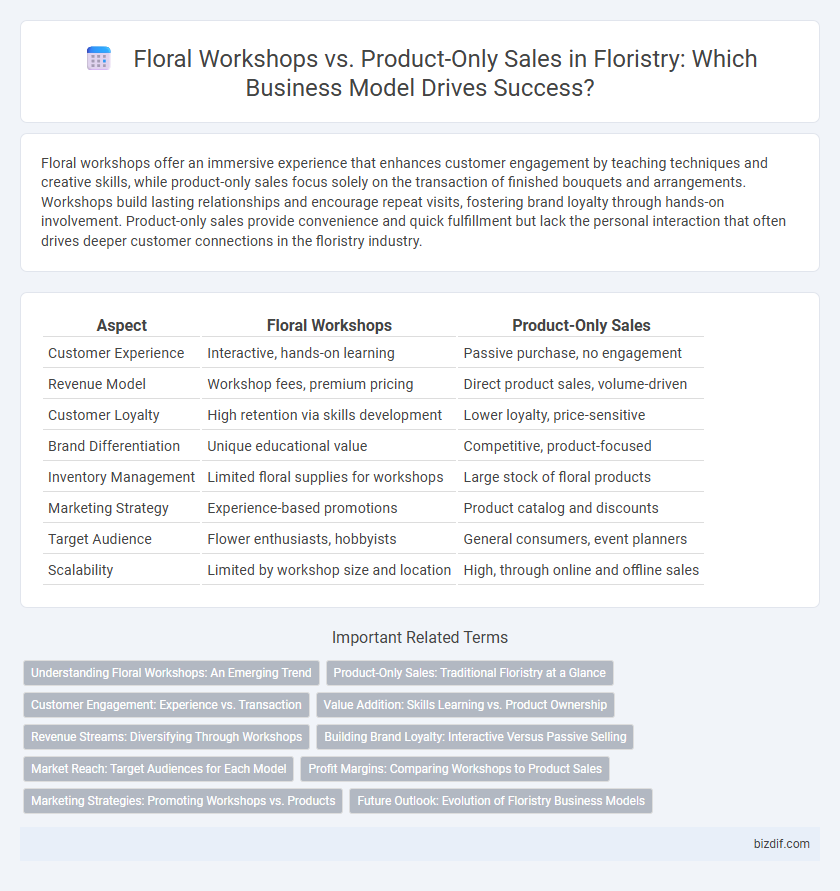Floral workshops offer an immersive experience that enhances customer engagement by teaching techniques and creative skills, while product-only sales focus solely on the transaction of finished bouquets and arrangements. Workshops build lasting relationships and encourage repeat visits, fostering brand loyalty through hands-on involvement. Product-only sales provide convenience and quick fulfillment but lack the personal interaction that often drives deeper customer connections in the floristry industry.
Table of Comparison
| Aspect | Floral Workshops | Product-Only Sales |
|---|---|---|
| Customer Experience | Interactive, hands-on learning | Passive purchase, no engagement |
| Revenue Model | Workshop fees, premium pricing | Direct product sales, volume-driven |
| Customer Loyalty | High retention via skills development | Lower loyalty, price-sensitive |
| Brand Differentiation | Unique educational value | Competitive, product-focused |
| Inventory Management | Limited floral supplies for workshops | Large stock of floral products |
| Marketing Strategy | Experience-based promotions | Product catalog and discounts |
| Target Audience | Flower enthusiasts, hobbyists | General consumers, event planners |
| Scalability | Limited by workshop size and location | High, through online and offline sales |
Understanding Floral Workshops: An Emerging Trend
Floral workshops have emerged as a dynamic trend in the floristry industry, offering hands-on learning experiences that deepen customer engagement beyond traditional product-only sales. These interactive sessions enable participants to develop floral design skills and foster a personal connection with the art of flower arranging, increasing brand loyalty and customer retention. Market data indicates that businesses incorporating workshops see higher revenue diversification and enhanced community presence compared to those relying solely on direct floral product sales.
Product-Only Sales: Traditional Floristry at a Glance
Product-only sales in traditional floristry emphasize ready-made arrangements and individual blooms, catering to customers seeking convenience and immediate floral needs. This approach relies heavily on floral inventory management, seasonal availability, and premium quality control to maintain customer satisfaction. By prioritizing visual appeal and freshness, florists sustain steady revenue without the interactive element of workshops.
Customer Engagement: Experience vs. Transaction
Floral workshops foster deeper customer engagement by providing an immersive, hands-on experience that builds emotional connections and brand loyalty. Product-only sales focus on transactional interactions, limiting customer involvement to purchasing without fostering lasting relationships. Workshops transform casual buyers into brand advocates by blending creativity with education, enhancing overall customer satisfaction and retention.
Value Addition: Skills Learning vs. Product Ownership
Floral workshops offer value addition through hands-on skills learning, enabling participants to master flower arranging techniques and cultivate creativity. Product-only sales limit customers to ownership without the experiential knowledge that enhances appreciation and long-term engagement. Workshops foster customer loyalty by transforming buyers into skilled hobbyists who perceive greater worth beyond mere possession of floral products.
Revenue Streams: Diversifying Through Workshops
Floral workshops generate additional revenue streams by offering hands-on experiences that attract a diverse clientele beyond traditional product sales. These interactive sessions increase customer engagement and brand loyalty, often leading to higher lifetime value per client. Combining workshops with product-only sales allows florists to stabilize income and capitalize on seasonal demand fluctuations.
Building Brand Loyalty: Interactive Versus Passive Selling
Floral workshops create immersive experiences that foster deeper emotional connections between customers and the brand, enhancing brand loyalty through active participation and skill-building. Product-only sales offer convenience but lack the personalized interaction that encourages repeat engagement and word-of-mouth promotion. Interactive floral workshops drive customer retention by transforming buyers into brand advocates who value both the art and the product.
Market Reach: Target Audiences for Each Model
Floral workshops attract diverse audiences including hobbyists, event planners, and wedding coordinators, expanding market reach through experiential learning and hands-on engagement. Product-only sales primarily target consumers seeking convenience and immediate purchase of floral arrangements or supplies, catering to retail customers and last-minute buyers. Combining workshops with product sales broadens potential market segments, enhancing customer loyalty and creating multiple revenue streams within the floristry industry.
Profit Margins: Comparing Workshops to Product Sales
Floral workshops typically yield higher profit margins than product-only sales due to the experiential value and personalized instruction that justify premium pricing. Workshops often have lower material costs per customer while maximizing revenue through participant fees, whereas product sales face consistent supply expenses and competitive pricing pressures. Integrating hands-on floral classes can enhance overall business profitability by diversifying income streams beyond standard product margins.
Marketing Strategies: Promoting Workshops vs. Products
Floral workshops foster customer engagement by offering hands-on experiences that enhance brand loyalty and create memorable interactions, driving word-of-mouth promotion. Product-only sales rely heavily on visual marketing through social media, e-commerce optimization, and seasonal campaigns to attract immediate purchases. Leveraging user-generated content and targeted ads tailored to workshop participants or product buyers amplifies marketing effectiveness in both strategies.
Future Outlook: Evolution of Floristry Business Models
Floral workshops are reshaping the floristry landscape by fostering customer engagement and experiential learning, creating a personalized brand connection beyond product transactions. The future of floristry business models emphasizes blending interactive workshops with traditional product sales, leveraging digital platforms to reach broader audiences and boost revenue streams. Integrating subscription-based floral classes and bespoke arrangements positions florists to capitalize on consumer trends favoring sustainability and creativity in purchasing decisions.
Floral workshops vs product-only sales Infographic

 bizdif.com
bizdif.com